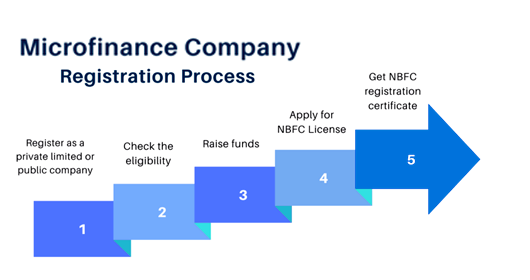Camwel Solutions LLP offers expert services for Microfinance Company Registration, guiding businesses through the legal and regulatory steps required for smooth and hassle-free registration. Our team ensures full compliance with RBI guidelines and other regulatory bodies, helping you establish a microfinance company with ease.
Alongside registration services, we provide Camwel Banking Software, a comprehensive and tightly integrated solution for financial institutions. This highly parameterized and user-configurable software combines a user-friendly front-end with robust back-end processes to manage end-to-end operations efficiently. Designed to minimize the total cost of ownership, it offers secure and centralized data storage across all branches. The software allows for separate logins for each branch, ensuring seamless operation in a web-based environment while maintaining data integrity across all locations.
![]() Package inclusions:
Package inclusions:
![]() Procedure for Microfinance Company
Registration
Procedure for Microfinance Company
Registration
![]() Liaising with the concerned
regulatory authorities for microfinance company registration
Liaising with the concerned
regulatory authorities for microfinance company registration
![]() Documentation Support
Documentation Support
![]() Compliance Services
Compliance Services

![]() The registration process for microfinance
companies requires compliance with RBI guidelines for NBFCs.
The registration process for microfinance
companies requires compliance with RBI guidelines for NBFCs.
![]() Prepare DSC. DIN &
Name approval: The first step is to file for Digital Signature Certificate (DSC),
Director Identification Number (DIN), and name approval. The proposed name should be unique and reflect your brand in a single
word. Additionally, a maximum of 6 name options can be filed at once.
Prepare DSC. DIN &
Name approval: The first step is to file for Digital Signature Certificate (DSC),
Director Identification Number (DIN), and name approval. The proposed name should be unique and reflect your brand in a single
word. Additionally, a maximum of 6 name options can be filed at once.
![]() Apply for License
: The most important step is to obtain a government license to perform social work
in India with the proper application and attachments.
Apply for License
: The most important step is to obtain a government license to perform social work
in India with the proper application and attachments.
![]() File for
incorporation: The third step is to file the incorporation with all necessary
documents attached, including MOA, AOA, and declarations.
File for
incorporation: The third step is to file the incorporation with all necessary
documents attached, including MOA, AOA, and declarations.


It is important to note that microfinance companies are not allowed to accept any kind of deposits from the public. Therefore, this rule applies to section 8 companies as well, in order to comply with the law. Section 8 companies typically raise funds as per the requirements of their philanthropic and socially responsible activities. As a result, such companies focus on increasing their income through various forms of donations.
There is an alternative option available. Firstly, the company needs to be registered as a Non-Deposit-taking company in accordance with the guidelines of the Reserve Bank of India (RBI). Once the registration process is completed, you can apply for permission to accept deposits as per the RBI's regulations.

The following are the benefits of securing Microfinance Company Registration
Once the microfinance company is established, its operations will be self-sufficient.
The first step is to file for Digital Signature Certificate (DSC), Director Identification Number (DIN), and name approval. The proposed name should be unique and reflect your brand in a single word. Additionally, a maximum of 6 name options can be filed at once.
It is not mandatory to fulfill any minimum capital requirements for setting up a microfinance company.
There is no requirement for RBI approval to establish a microfinance company as the minimum compliance requirement.
Starting this type of entity promotes entrepreneurship to fulfill business requirements.
Providing different forms of loans increases credibility and public trust.
Registering a microfinance company can often be a straightforward process for obtaining funding
Microfinance companies have better access to rural areas and can provide loans to these areas, making them more accessible than large banks and industries.
When you register a Microfinance company in India, you can enjoy numerous tax benefits.
Microfinance institutions have the freedom to charge high interest rates, typically ranging from 20% to 25%.
Under the provisions of the Companies Act, 2013, a microfinance company must be registered as a separate legal entity from its members.
The following process is required for microfinance company registration (MFI-NBFC)
The first and foremost step for a Microfinance Company is to register as a company under the provisions of the Companies Act, 2013. To do so, The SPICe+ Form must be utilized. At the time of registration, the type of business structure chosen for this form of organization can either be a private limited company or a public limited company. The capital authorized for the entity can be as low as Rs. 1,25,000/-.
To apply for a new application, the applicant needs to click on SPICE Plus listed under the respective MCA services. If the company already exists, they should click on the existing application. Next, the applicant should select the correct category of the company. It's important to also select the sub-category of the company. Once this is done, the applicant will be redirected to another page to complete the application process.
All activities carried out by the company must be specified for microfinance company registration.
In the next step for Microfinance company registration, the company has to raise about Rs 5 Crore or 2 Crore as per the requirements.
All certified copies of the microfinance company must be submitted to the RBI. The following documents or certified copies should be included:
![]() Incorporation Certificate- Copies
Incorporation Certificate- Copies
![]() Memorandum of Association and Articles of Association
Memorandum of Association and Articles of Association
![]() Copy of the FD (Fixed Deposit Receipt)
Copy of the FD (Fixed Deposit Receipt)
![]() Certificate from Bankers Related to No Liens on the Net
Owned Fund.
Certificate from Bankers Related to No Liens on the Net
Owned Fund.
After this process, the applicant must submit hard copies to the respective regional RBI office for scrutiny and due diligence.
In the next step, the applicant needs to open a bank account. To complete this process, an RBI application must be submitted for a no-lien certificate.
The applicant can easily carry out the registration process online. The service includes name reservation, issuance of DIN, mandatory issuance of PAN, TAN, EPFO, ESIC and other forms of registration as required. Once the registration process is complete, the following compliances must be fulfilled.
![]() If a new company is being formed, its name must be
reserved.
If a new company is being formed, its name must be
reserved.
![]() All compliances related to EPFO, GST, Income Tax, PAN,
TAN, bank account, and professional tax registration (if required) must be carried out
in compliance with applicable laws.
All compliances related to EPFO, GST, Income Tax, PAN,
TAN, bank account, and professional tax registration (if required) must be carried out
in compliance with applicable laws.
To register a microfinance company, the applicant needs to ensure that the company's name is available. To do so, they must click on the 'auto check' option. Additionally, all other necessary information related to the name of the company must be submitted. Both part A and part B of the registration process should be completed. The following details should also be submitted along with the above information
![]() Name of the company
Name of the company
![]() Location of registered office of the company
Location of registered office of the company
![]() Activities which are carried out by the company
Activities which are carried out by the company
![]() PAN, TAN and other forms of registrations have to be
carried out
PAN, TAN and other forms of registrations have to be
carried out
![]() It would be useful to carry out a pre-scrutiny check for
the above process related to registration
It would be useful to carry out a pre-scrutiny check for
the above process related to registration
![]() To complete the process, all the details mentioned in
Part B of the PDF need to be downloaded. Additionally, the digital signature
certificates of the directors must be affixed to the forms. You will need to download
all the necessary forms, including the AGILE-PRO, SPICe+MoA and SPICe+AoA, URC-1 and
INC-9, and link and upload them online. After this, a request number will be generated.
You will need to make the payment, following which the information provided in the forms
will be processed.
To complete the process, all the details mentioned in
Part B of the PDF need to be downloaded. Additionally, the digital signature
certificates of the directors must be affixed to the forms. You will need to download
all the necessary forms, including the AGILE-PRO, SPICe+MoA and SPICe+AoA, URC-1 and
INC-9, and link and upload them online. After this, a request number will be generated.
You will need to make the payment, following which the information provided in the forms
will be processed.
In order to register a Microfinance company with the RBI, the applicant must complete an online registration process and obtain a unique 'Company Application Reference Number'.
The documents required for registering a Microfinance company in India are similar to those required for registering a Section 8 company.
Loans provided by Microfinance Institutions
Usually, a small amount of loans would be provided by a Microfinance Company. As these loans are provided to the rural sectors of the society, such loans would not be secured. However the company is capable of charging interest rate in accordance with the requirements.
![]() The Interest rate charged by a
microfinance company must not exceed a particular level.
The Interest rate charged by a
microfinance company must not exceed a particular level.
![]() The interest rate charged by a
MFI must be reasonable.
The interest rate charged by a
MFI must be reasonable.
![]() The requirements of the loans
being paid must comply with the requirements related to an MFI.
The requirements of the loans
being paid must comply with the requirements related to an MFI.
How to reach Enterslice for Microfinance Company Registration